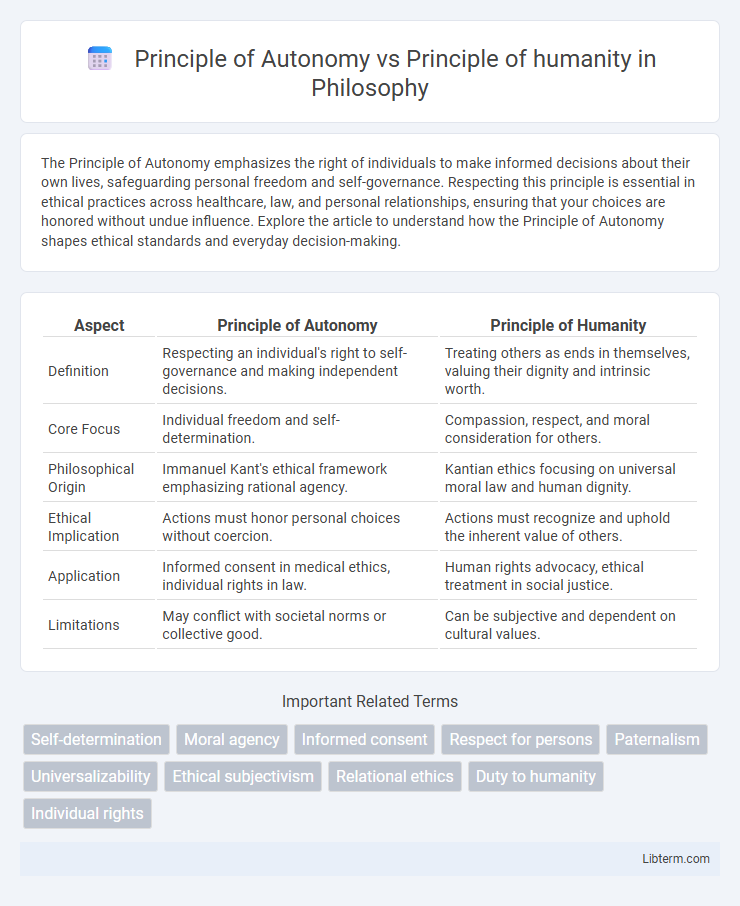The Principle of Autonomy emphasizes the right of individuals to make informed decisions about their own lives, safeguarding personal freedom and self-governance. Respecting this principle is essential in ethical practices across healthcare, law, and personal relationships, ensuring that your choices are honored without undue influence. Explore the article to understand how the Principle of Autonomy shapes ethical standards and everyday decision-making.
Table of Comparison
| Aspect | Principle of Autonomy | Principle of Humanity |
|---|---|---|
| Definition | Respecting an individual's right to self-governance and making independent decisions. | Treating others as ends in themselves, valuing their dignity and intrinsic worth. |
| Core Focus | Individual freedom and self-determination. | Compassion, respect, and moral consideration for others. |
| Philosophical Origin | Immanuel Kant's ethical framework emphasizing rational agency. | Kantian ethics focusing on universal moral law and human dignity. |
| Ethical Implication | Actions must honor personal choices without coercion. | Actions must recognize and uphold the inherent value of others. |
| Application | Informed consent in medical ethics, individual rights in law. | Human rights advocacy, ethical treatment in social justice. |
| Limitations | May conflict with societal norms or collective good. | Can be subjective and dependent on cultural values. |
Understanding the Principle of Autonomy
The Principle of Autonomy emphasizes respecting an individual's right to make informed decisions about their own life and body, underscoring personal freedom and self-governance. Understanding this principle involves recognizing the capacity of individuals to act intentionally, with understanding, and without controlling influences. It forms the ethical foundation for informed consent in medical ethics, ensuring respect for patients' choices and promoting dignity.
Defining the Principle of Humanity
The Principle of Humanity emphasizes respecting human dignity, compassion, and the obligation to minimize harm in ethical decision-making. It requires healthcare professionals to prioritize patient well-being and avoid actions that could cause suffering or injustice. This principle serves as a moral foundation guiding ethical care, balancing medical interventions with empathy and respect for human life.
Historical Origins of Autonomy and Humanity
The Principle of Autonomy originated from Enlightenment thinkers such as Immanuel Kant, emphasizing individual self-governance and moral agency. The Principle of Humanity, rooted in humanitarian philosophies and international law, advocates for respect and dignity toward all individuals regardless of status. Historical developments in medical ethics and human rights law have solidified these principles as foundational to contemporary ethical frameworks.
Philosophical Foundations: Kant and Beyond
The Principle of Autonomy, rooted in Kantian philosophy, emphasizes individuals' capacity for self-governance and moral decision-making based on rationality and respect for persons as ends in themselves. In contrast, the Principle of Humanity prioritizes compassion and the inherent dignity of human beings, often extending ethical consideration beyond rational agency to include vulnerability and care. Philosophical debates extend beyond Kant's framework, incorporating contemporary perspectives that balance respect for individual autonomy with empathetic commitment to human welfare.
Core Differences Between Autonomy and Humanity
The Principle of Autonomy emphasizes individual self-determination and the right to make personal decisions without external interference, prioritizing personal freedom and respect for one's choices. In contrast, the Principle of Humanity focuses on compassion, care, and the well-being of others, highlighting moral obligations to prevent harm and promote human dignity. Core differences lie in autonomy centering on individual rights and agency, while humanity centers on empathy and the ethical imperative to support and protect others.
Ethical Dilemmas: Autonomy vs. Humanity
The ethical dilemma between the Principle of Autonomy and the Principle of Humanity centers on respecting individuals' rights to make independent decisions while ensuring their well-being and preventing harm. Healthcare professionals often face challenges when a patient's autonomous choices conflict with interventions aimed at beneficence or non-maleficence, necessitating a balance between honoring personal freedom and promoting humane care. Resolving this tension requires careful ethical analysis, considering patient capacity, informed consent, and the potential impact on health outcomes.
Autonomy and Humanity in Medical Ethics
Autonomy in medical ethics emphasizes the patient's right to make informed decisions about their own healthcare, respecting individual freedom and self-determination. The principle of humanity prioritizes compassion and the well-being of patients, ensuring care is delivered with empathy and respect for human dignity. Balancing autonomy and humanity requires healthcare providers to honor patients' choices while maintaining a caring and supportive therapeutic relationship.
Criticisms and Limitations of Each Principle
The Principle of Autonomy faces criticism for potentially neglecting vulnerable populations who may lack the capacity to make fully informed decisions, thereby risking harm despite respecting individual freedom. The Principle of Humanity is limited by its subjective interpretation, which can justify overriding personal choices in the name of perceived welfare, potentially leading to paternalism. Both principles struggle to balance respect for individual rights with protection against harm, often resulting in ethical conflicts within medical and legal frameworks.
Real-World Applications and Case Studies
The Principle of Autonomy emphasizes respecting individuals' rights to make informed decisions about their own lives, particularly evident in medical consent cases such as Jehovah's Witnesses refusing blood transfusions. The Principle of Humanity focuses on alleviating suffering and promoting welfare, demonstrated in humanitarian interventions like disaster relief where aid prioritizes saving lives and reducing harm. Real-world applications highlight tensions between these principles, often requiring ethical frameworks to balance personal freedom with collective well-being in healthcare, law, and social services.
Striking a Balance: Integrating Both Principles
Striking a balance between the Principle of Autonomy and the Principle of Humanity involves respecting individual decision-making while ensuring compassionate care that alleviates suffering. Ethical frameworks in healthcare integrate patient autonomy by honoring informed consent alongside humanitarian efforts to protect vulnerable populations from harm. Effective practice requires ongoing dialogue between medical professionals and patients to harmonize personal freedom with empathetic interventions.
Principle of Autonomy Infographic

 libterm.com
libterm.com